Election 2016
Pre-Conventions: The Electorate is Dissatisfied and Polarized
7/13/2016
In advance of the Republican and Democratic conventions this month, the latest national poll from the Fishlinger Center for Public Policy Research at the University of Mount Saint Vincent finds most voters feeling negative about the direction of the country and the state of the government’s policies.
Few voters are happy about the process that has made Hillary Clinton and Donald Trump the major parties’ presumptive nominees. Mrs. Clinton is down to a 5-point advantage over Mr. Trump as the voters’ first choice for president. Only a little over half of the likely voters selected either candidate as their first choice. Nearly 4 in 10 do not consider either Mrs. Clinton or Mr. Trump as their first choice from a list of potential candidates.
Mrs. Clinton is seen as more qualified than Mr. Trump, but both candidates have trouble regarding their likeability and voters’ perceptions of their honesty.
The Fishlinger Center for Public Policy Research at the University of Mount Saint Vincent seeks to foster meaningful dialog on key public policy issues through independent, objective public opinion research. The national surveys of 2016 will focus on political issues in the United States ahead of the Presidential election in November.
Before the start of the primaries, the Fishlinger Center conducted an online poll January 4 to 25, 2016 with 1,000 adults nationwide, of whom 912 said they were registered or planned to register to vote. The second poll was conducted June 8 to July 5 with 1,000 adults nationwide, of whom 845 said they planned to vote in the presidential election in November.
How are things going in the U.S. these days?
Overall, 60 percent of voters say the country is headed in the wrong direction, and 40 percent say it is moving in the right direction. However, there are substantial partisan differences.
Throughout Barack Obama’s presidency, Democrats have tended to be much more supportive of the President than Republicans. This poll shows a similar divide: Most Democratic voters regard the country as headed in the right direction, while nearly three-quarters of Republicans and 7 in 10 independents say the country is moving in the wrong direction.
In the same way, voters who said their first choice is Hillary Clinton see the United States moving in a positive course, while those who selected Donald Trump as their first choice say the country is headed in the wrong direction.

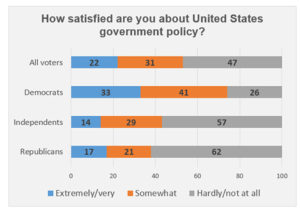 Voters are also not very enthusiastic about government policies in general, or specifically the country’s domestic or foreign policies. Nearly half of voters are hardly or not at all satisfied with government policies, 3 in 10 are somewhat satisfied and less than a quarter are very or extremely satisfied. Again, Democrats are more positive about the programs of the Obama administration than Republicans and independents.
Voters are also not very enthusiastic about government policies in general, or specifically the country’s domestic or foreign policies. Nearly half of voters are hardly or not at all satisfied with government policies, 3 in 10 are somewhat satisfied and less than a quarter are very or extremely satisfied. Again, Democrats are more positive about the programs of the Obama administration than Republicans and independents.
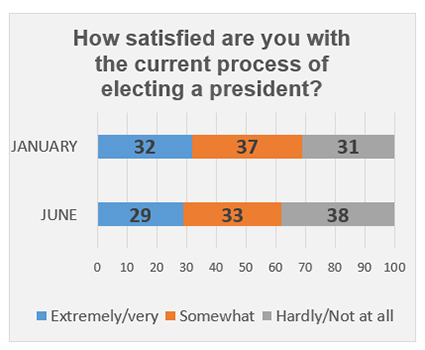 Views of the campaign
Views of the campaign
The months of primary campaigns did little to change voters’ views of the country’s election process.
Voters are slightly more negative compared with the results of the poll taken in January before any primaries were held.
At that time, about 3 in 10 voters were hardly or not at all satisfied with the process. Now, nearly 4 in 10 are not satisfied with how the United States goes about electing its president.
Perceptions of the Candidates
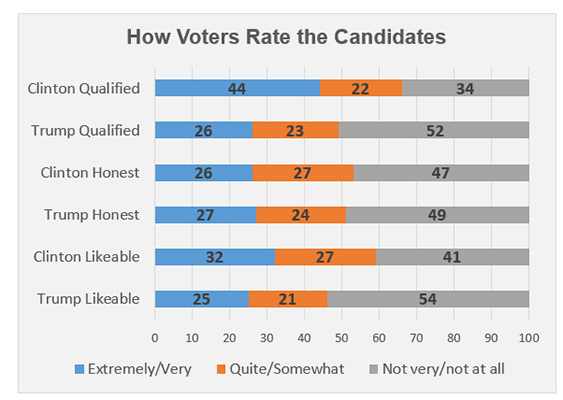 Voters find Mrs. Clinton more qualified and better able to deal with foreign and domestic policy than Mr. Trump. Neither candidate is seen as particularly honest or likeable.
Voters find Mrs. Clinton more qualified and better able to deal with foreign and domestic policy than Mr. Trump. Neither candidate is seen as particularly honest or likeable.
Of course, there are large partisan differences. For example, 73 percent of Democrats consider Mrs. Clinton extremely or very qualified, compared with 18 percent of Republicans and 32 percent of independents.
Republicans are not quite as positive about their party’s presumptive nominee. Forty-five percent of Republicans describe Mr. Trump as extremely or very qualified, along with 16 percent of Democrats and 21 percent of independents.
Profiles of Candidates Constituencies
The electorate is very polarized. Younger and unmarried voters are more likely to support Mrs. Clinton than Mr. Trump. Most black voters and a plurality of Hispanics prefer Mrs. Clinton. College educated voters and urbanites are more inclined to select her as their first choice. White voters are slightly more inclined to support Mr. Trump than Mrs. Clinton. He also does better with voters who live in rural areas.
Voters who support Mrs. Clinton are much more supportive of same day registration than Mr. Trump’s supporters (75 percent vs. 45 percent). Most of those who prefer Mrs. Clinton support requiring photo identification verification for voting, along with nearly voters who back Mr. Trump (69 percent vs. 93 percent).
Compared with voters who selected Mrs. Clinton as their first choice, Mr. Trump’s supporters are much more dissatisfied with current government policies, both domestic and foreign.
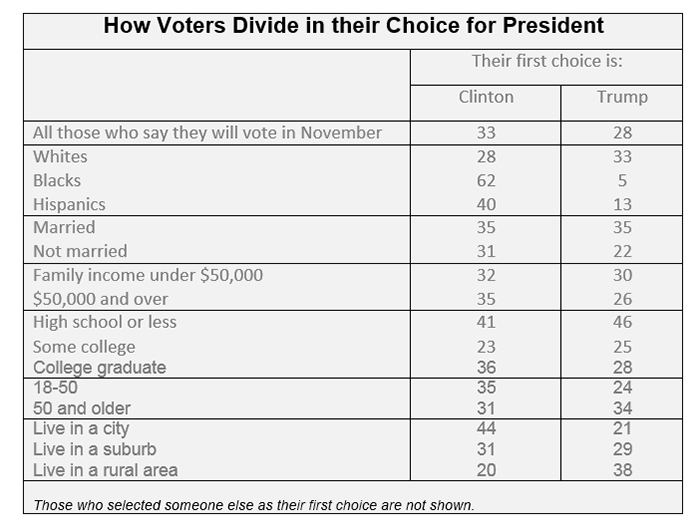
Who will win in November?
When asked who their first choice would be if the election were held today, 33 percent selected Mrs. Clinton and 28 percent picked Mr. Trump. Nearly 4 in 10 selected someone else from a list of potential candidates remaining after the primaries.
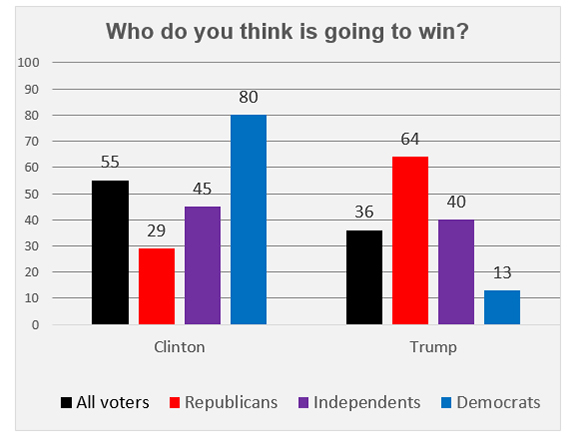
Academic research released in 2012, suggests that poll questions about who voters expect to win are a better guide to the ultimate outcome that surveys of voters’ intentions. If that holds true in 2016, the poll has good news for Mrs. Clinton. Fifty-five percent of voters expect to see Mrs. Clinton elected in November and 36 percent think Mr. Trump will prevail.

Democrats are very confident about their party’s potential standard bearer chances. Eighty percent say Mrs. Clinton will win in November. Republicans are less sure about Mr. Trump. About two-thirds say Mr. Trump will win, while nearly 3 in 10 think Mrs. Clinton will be elected. Independents are closely divided: 45 percent say Mrs. Clinton and 40 percent say Mr. Trump. But November is still months away, and opinions could certainly change once the presidential campaign get into high gear after the conventions.
Neither presumptive nominee has named a vice presidential pick. While past research has found the vice presidential selection generally has little effect on the final outcome, the 2016 presidential election has been far from traditional so far. Therefore lessons from previous elections may be moot.
And it is unknown what effect of the third party candidates might have on the election. Currently, an average of about 10 percent of voters support either the Libertarian or the Green Party candidate.
Survey Methodology
The fieldwork for the Fishlinger Center Poll was conducted using a blended national Survey Sampling Inc. panel. Online interviews were conducted with 912 adults who reported they are registered or plan to register to vote January 4 to 25, 2016 and with 845 adults who said they plan to vote interviewed online June 8 to July 5, 2016. The survey has a credibility interval of plus or minus 4.0 percentage points for those who plan to vote in November. The credibility interval may be larger for other sub-groups. The poll is subject to other potential sources of error including, but not limited to coverage and measurement error. Data were rim weighted to match the national population on age, sex, Hispanic origin and race. Question wording and topline results are available at [email protected].
About the Fishlinger Center for Public Policy
The Fishlinger Center for Public Policy Research opened in February 2015 at the University of Mount Saint Vincent. The Center, a member of the American Association for Public Opinion Research (AAPOR), conducts deep and broad studies of public opinion on key public policy concerns through independent and objective research conducted by students, faculty, and other members of the academic community.
By providing a forum for discourse that can stimulate intelligent dialog about issues that deeply affect all Americans, the Center illustrates and enhances the relationship between the work of the College and the common good.
About the University of Mount Saint Vincent
Founded in 1847 by the Sisters of Charity, the University of Mount Saint Vincent offers nationally recognized liberal arts education and a select array of professional fields of study on a landmark campus overlooking the Hudson River. Committed to the education of the whole person, and enriched by the unparalleled cultural, educational and career opportunities of New York City, the College equips students with the knowledge, skills and experiences necessary for lives of achievement, professional accomplishment and leadership in the 21st century.
